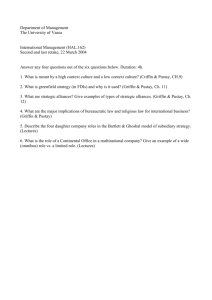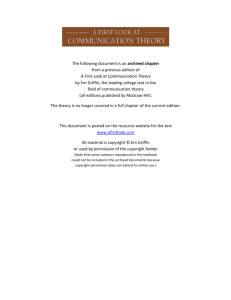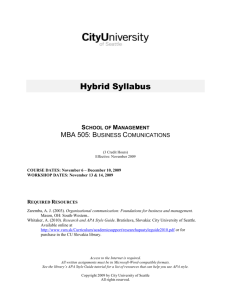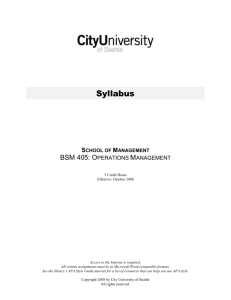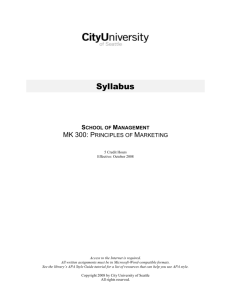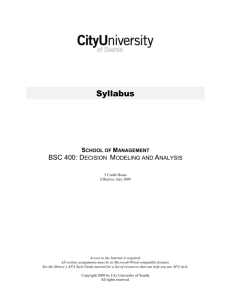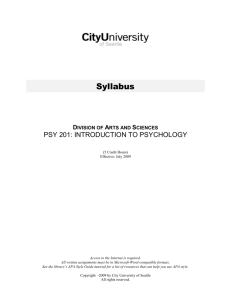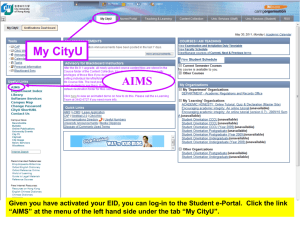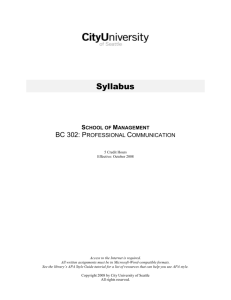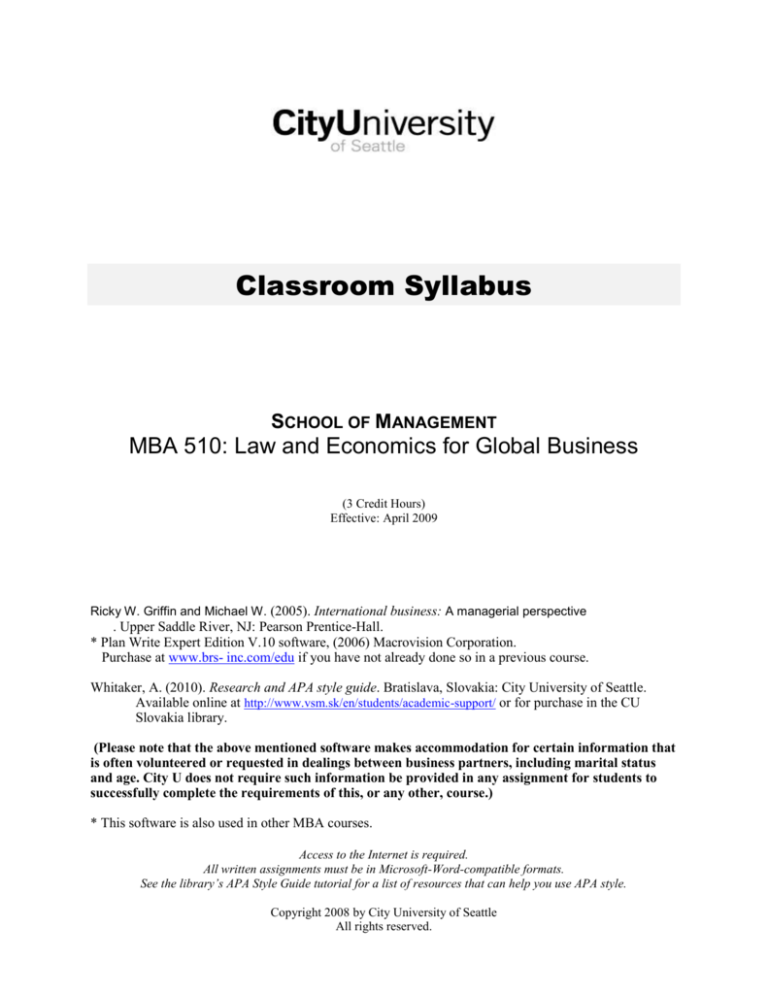
Classroom Syllabus
SCHOOL OF MANAGEMENT
MBA 510: Law and Economics for Global Business
(3 Credit Hours)
Effective: April 2009
Ricky W. Griffin and Michael W. (2005). International business: A managerial perspective
. Upper Saddle River, NJ: Pearson Prentice-Hall.
* Plan Write Expert Edition V.10 software, (2006) Macrovision Corporation.
Purchase at www.brs- inc.com/edu if you have not already done so in a previous course.
Whitaker, A. (2010). Research and APA style guide. Bratislava, Slovakia: City University of Seattle.
Available online at http://www.vsm.sk/en/students/academic-support/ or for purchase in the CU
Slovakia library.
(Please note that the above mentioned software makes accommodation for certain information that
is often volunteered or requested in dealings between business partners, including marital status
and age. City U does not require such information be provided in any assignment for students to
successfully complete the requirements of this, or any other, course.)
* This software is also used in other MBA courses.
Access to the Internet is required.
All written assignments must be in Microsoft-Word-compatible formats.
See the library’s APA Style Guide tutorial for a list of resources that can help you use APA style.
Copyright 2008 by City University of Seattle
All rights reserved.
MBA 510: Law and Economics for Global Business
Faculty
Faculty Name: Assoc. Prof. Dr. Menbere Workie Tiruneh, Ph.D.
Contact Information: mworkie@cityu.eu
Course Description
In this course you will study the legal and economic context of business. You will examine the global
business environment from many aspects- legal, social, cultural, technological, ethical and economic. The
focus will not be on a specific business, but rather concerns of all businesses operating in a global
marketplace.
Prerequisite: MBA 500, MBA 505.
Course Resources
Required and recommended resources to complete coursework and assignments are listed on the
My.CityU portal at Library>Resources by Course.
CITYU Learning Goals
The content of this course addresses the following CityU Learning Goals:
Professional Competency
Professional Identity
Strong Communication and Interpersonal Skills
Critical Thinking
Commitment to Ethical Practice and Service
Lifelong Learning
Program Context
This course contributes to the following end-of-program outcomes:
Communicate effectively both orally and in writing with internal and external stakeholders;
Lead individuals and organizations to achieve business missions and goals in a global
environment;
Build, lead and participate in productive and diverse teams;
Use people skills to manage diverse work environments and navigate organizational politics;
Capitalize on business opportunities in a rapidly changing environment by thinking critically and
applying quantitative procedures and tools;
MBA 510
Page 210
Eff: 11/09
Recognize when information is needed; find, evaluate and use it to support continuous
professional and organizational development.
Course Outcomes
After completing this course, you will be able to:
Conduct an environmental scan to include business sector, industry, country (governmental,
social, cultural), and technology;
Assess the external environment to make business decisions;
Identify trends to conduct strategic planning;
Evaluate the legal risks and ethical challenges found in a broad range of business situations.
Core Concepts, Knowledge, and Skills
The course will cover the following concepts and topics:
Industry descriptions;
Trend analysis;
Economic cycles;
Social/ cultural context of business;
Political/ regulatory issues;
Legal environment;
Financial markets;
GDP, inflation;
Market structures;
Supply and distribution channels in industry.
Overview of Course Grading
The grade you receive for the course will be derived using City University of Seattle’s decimal grading
system, based on the following:
Overview of Required Assignments
% of Final Grade
Business Plan Proposal
Company Description
Industry Analysis and Trends
Country Report
Final Exam
Article presentation
10%
15%
15%
20%
20%
20%
TOTAL
100%
Specifics of Course Assignments
MBA 510
Page 310
Eff: 11/09
Your instructor will provide grading rubrics that will provide more detail as to how this assignment will
be graded.
Readings
There are required readings for each session.
Business Plan Assignments
There are four assignments based on your Business Plan.
Part 1. Business Plan Proposal
The Business Plan Proposal will identify the basic core elements of the Business Plan. Those elements
include identifying the basic deliverable, relevant market, potential clients, support requirements and,
finally, the target audience of their plan. This proposal is the students own thoughts and is designed to
measure the student’s ability to conceptualize their business.
Components
% Grade
Identify your deliverable
Identify your domestic and international market (choosing a single
additional country)
Identify customers and what motivates them to your deliverable
Identify the target audience of your Business Plan (e.g.: potential partners,
shareholders, venture capitalists, bankers)
Proper grammar, spelling, syntax, and punctuation
20%
TOTAL
100%
25%
25%
20%
10%
Part 2. Company Description
Using the Plan Write software program and competing the Interview section you will prepare a company
description for your business which should include but not be limited to the company’s mission
statement, services, development to date, legal form, and status of the business and ownership.
Components
% Grade
Company name, trademarks, internet domain name
Legal status and ownership
Product and services
Mission
Management
Facilities and location
Financial status
Timeline and milestones
Proper grammar, spelling, syntax, and punctuation
10%
10%
15%
20%
10%
10%
10%
10%
5%
MBA 510
Page 410
Eff: 11/09
TOTAL
100%
3. Industry Analysis and Trends
Using the Plan Write software program and competing the Narration section Interview section you will
prepare an industry analysis and trends.
Components
% Grade
Identifies the companies who offer products/services that are substitutes
for your organization’s products
Demonstrate an understanding of the characteristics of the specified
economic sector and it’s sensitivity to business cycle fluctuations
Demonstrate an understanding of the various phases in the industry
life cycle and trends
Described an understanding of long term opportunities
Grammar, spelling, syntax, and punctuation
APA referencing and format
TOTAL
25%
20%
20%
25%
5%
5%
100%
Part 4. Country Report
As part of the Business Plan, you will write a country report evaluating the risks and opportunities of
taking your business international.
Components
% Grade
Discuss the advantages and opportunities of expansion
30%
Discuss several methods for entering an international market (exporting,
licensing, franchising, joint venture, or wholly owned subsidiary) and the 20%
risks of the one selected
20%
Identify the legal and economic issues of the target country
Provide general time lines for going global
Grammar, spelling, syntax, and punctuation
APA referencing/format
20%
5%
5%
TOTAL
100%
Discussion Questions
Online classes are required to use the Discussion Board. It is not required for in class formats.
MBA 510
Page 510
Eff: 11/09
Components
% Grade
Meets requirements of the activity in a timely manner
Adds insightful or new ideas, comments, or questions relevant to
the activity and/or other students’ posts
Appropriate references readings, materials in course sessions and other
postings
Writes clearly, concisely, and grammatically
25%
TOTAL
100%
25%
25%
25%
Final Exam
Instructors will determine the content and format of the exam.
Component
% Grade
Clear demonstration of grasp of major issues
Valid arguments; appropriate supportive detail
Appropriate analysis, evaluation, and synthesis
Demonstrated ability to employ terms and concepts from
course
Proper grammar, spelling, syntax, and punctuation
TOTAL
20%
20%
20%
20%
20%
100%
ARTICLE PRESENTATION
The primary objective of the article presentation is to get students involved in the teaching-learning
process and make them feel that they are part of the class. Moreover, this should give them the chance to
demonstrate and improve their skills of presentation. The task, in this spirit, is simply to choose an up-todate article that is related to international business and present that in the class. Each presentation will last
10 – 12 minutes followed by a few minutes of discussions. All presentations should be power point and
should be sent to the instructor by e-mail a minimum of two days before the date of the presentation.
Evaluation is based mainly on the following points:
Clear presentation of the problem under consideration
Clear presentation of the objective of the article
Clear presentation of the methodologies used in the article
Logical organization and timing
Relevance of own opinion to the paper presented
Total 100%
MBA 510
Page 610
Eff: 11/09
20%
30%
30%
10%
10%
TOTAL
100%
Course Policies
This document provides an overview of the course foundation elements, assignments, schedules, and
activities. For information about general, City University of Seattle policies, please see the City
University of Seattle catalog. If you have additional questions about the course, please contact your
instructor.
Late Assignments
Students are expected to meet submission requirements for assignments in a timely manner. Evaluation
includes an assessment of timeliness. Late assignments jeopardize your learning, and may also penalize
your classmates as most assignments will not be returned to students until all students have submitted
their work. Late submission of assignments may be penalized up to 50% of the grade per week. Your
instructor will provide additional details.
Quizzes, exams, and comprehensive assessments must be taken at the scheduled times. Any absences or
late submissions must be approved by your instructor before the scheduled assessment date. Not
completing a quiz, exam, or comprehensive assessment in a timely manner will result in a grade of zero
unless a student has been preapproved by the instructor to complete the assessment at an alternative time.
Participation
Whether in class, online, or in a mixed mode setting, students will be graded on their participation in
classroom discussions; their ability to present, explain, or defend alternative viewpoints; and the degree to
which they have mastered the concepts and principles addressed in this course. Written work will be
assessed not only on relevance to the subject presented, but also on adherence to good written form and
professional presentation.
Students are expected to be actively engaged in all discussions as well as other activities. Active
engagement means contributing substantive, thoughtful and reflective responses. For online classes,
students must post their initial responses during the first three days of the week, and their responses to
other students’ postings during the last four days of the week.
Professional Writing
Assignments require error-free writing that uses standard English conventions and logical flow of
organization to address topics clearly, completely, and concisely. CityU requires the use of APA style.
University Policies
You are responsible for understanding and adhering to all of City University of Seattle’s
academic policies. The most current versions of these policies can be found in the University
Catalog that is linked from the CityU Web site.
MBA 510
Page 710
Eff: 11/09
Scholastic Honesty City University of Seattle expects each student to do his/her own work.
The University has "zero tolerance" for cheating, plagiarism, unauthorized collaboration on
assignments and papers, using "notes" during exams, submitting someone else's work as one's
own, submitting work previously submitted for another course, or facilitating acts of academic
dishonesty by others. Scholastic Honesty policy applies also to online discussions that represent
a part of assignments in online courses. You should cite all the information. Every reference
material used in discussion contributions must be cited according to the current Research & APA
Style Guide. The penalties are severe! A first offense results in a zero grade for the course and
suspension for one quarter; a second offense can result in a zero grade for the course and
suspension for two or more quarters; a third offense can result in expulsion from the University.
The Policy and Procedures may be found http://www.vsm.sk/en/students/scholastic-honesty/policies-andprocedures/ .
In addition to providing your work to the instructor for grading, you must also submit an
electronic copy for the City University of Seattle archives (unless the work is specifically
exempted by the instructor). You will not receive a grade for particular work until and unless you
submit this electronic copy. The procedure for submitting work to the archives is to upload it via
the website http://www.vsm.sk/en/students/on-line-center/uploader/uploader.html . Files should include the
cover page of the work with the student name, instructor name, course name and number, and
date. File names should indicate the type of assignment, such as “researchpaper.doc”,
“casestudy.doc” or “ thesis.doc” (student name should not be a part of the file name because the
system adds it). All files received into the archives are submitted to www.TurnItIn.com for
plagiarism checking.
Attendance
Students taking courses in any format at the University are expected to be diligent in their studies and to
attend class regularly.
Regular class attendance is important in achieving learning outcomes in the course and may be a valid
consideration in determining the final grade. For classes where a physical presence is required, a student
has attended if s/he is present at any time during the class session. For online classes, a student has
attended if s/he has posted or submitted an assignment. A complete copy of this policy can be found in
the University Catalog in the section titled Attendance Policy for Mixed Mode, Online and Correspondence
Courses.
Support Services
Disability Resources
If you are a student with a disability and you require an accommodation, please contact the Disability
Resource Office as soon as possible. For additional information, please see the section in the University
Catalog titled Students with Special Needs under Student Rights & Responsibilities.
MBA 510
Page 810
Eff: 11/09
Library Services
In order to help you succeed in this course, you have access to library services and resources 24 hours a
day, seven days a week. CityU librarians can help you formulate search strategies and locate materials
that are relevant to your coursework. For help, contact a CityU librarian through the Ask a Librarian
service. To find library resources, click on the Library link in the My.CityU portal.
Smarthinking
As a CityU student, you have access to 10 free hours of online tutoring offered through Smarthinking,
including writing support, from certified tutors 24 hours a day, seven days a week. Contact CityU’s
Student Support Center at info@cityu.edu to request your user name and password.
COURSE SCHEDULE
COURSE
SESSION/D
MODULE(S), TOPICS AND ASSIGNMENTS
READINGS
(CHAPTERS)
ATE
1.
Oct. 21, 2009
2.
Oct. 22, 2009
Introduction: An Overview of International Business
Griffin, Pustay (1)
Global Marketplaces and Business Centers
Griffin, Pustay (2)
Legal, Technological, and Political Forces
Griffin, Pustay (3)
The Role of Culture
Griffin, Pustay ( 4)
Ethics and Social Responsibility in International
Business
Griffin, Pustay (5)
International Trade and Investment Theory
Griffin, Pustay (6)
MBA 510
Page 910
Eff: 11/09
3.
Oct. 28, 2009
The International Monetary System and the Balance
of Payments.
Griffin, Pustay (7)
Foreign Exchange and International Financial
Markets
Griffin, Pustay (8)
DUE: Business Plan Assignment - Part 1:
Business Plan Proposal
4.
Oct. 29, 2009
Formation of International Trade Policies
Griffin, Pustay (9)
International Cooperation Among Nations
Griffin, Pustay (10)
International Strategic Management
Griffin, Pustay (11)
Strategies for Analysing and Entering Foreign
5.
Dec. 13, 2009 Markets
International Strategic Alliance
International Organization Design and Control
DUE: Business Plan Assignment – Part 2:
Company Description (complete Plan Write
software “Interview”)
DUE: Topics for presentations
Griffin, Pustay (12)
Leadership and Employee Behavior in International
6.
Dec. 14, 2009 Business
Griffin, Pustay (15)
Griffin, Pustay (13)
Griffin, Pustay (14)
Griffin, Pustay (16)
International Marketing
Griffin, Pustay (17)
International Financial Management
7.
December
18, 2009
DUE: Business Plan Assignment – Part 3:
Industry Analysis and Trends (complete Plan
Write software “Narration”)
DUE: Business Plan Assignment – Part 4: Country
Report
DUE: Final Exam
MBA 510
Page 1010
Eff: 11/09

